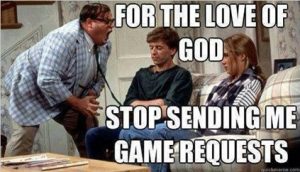12.1 Introduction: A Picture is Worth a Thousand Words
We live in a world in which visual literacy is an important skill. Visual literacy translates directly into a wide variety of careers—from fashion merchandising to interior design to real estate to business marketing to teaching. You know the saying: a picture’s worth a thousand words.
Without question, our entertainment, news, and advertisement industries understand the value of an image. Certainly the rise of social media as one of our primary means of communicating and sharing information has made it even more important to be well-versed in analyzing images.
The value that people assign to an image often says as much about the people as the image.
If you are a part of Gen Z, when you’re messaging and texting, your primary mode of communication and self-expression may be visual—in the form of memes. If so, you may already have a heightened understanding of the power of visual images. You know that even memes that do not contain words still hold messages and arguments. You know that visual images are an effective way to establish collective identity and audience. You know where to go to find good memes, and you know to head to Facebook if you want to find bad memes. You know that the criteria for a good meme differ depending on a person’s demographics and social identities. You know that audience appeal, relevance, and currency factor into the evaluation of memes.[1]
To illustrate this point, ask yourself: looking at the two collections of memes below, what can you tell about each person who sent them?
Meme Collection 1




Meme Collection 2




What information about each person can you tell based on their set of four memes? How are you coming up with your assessment of each person’s age, gender, social class, personality, preferred social media platform, and so on? What clues are you using as the basis for your argument?
One goal of this chapter is to increase your awareness of how you already analyze familiar visual works—like memes and advertisements— so that you can then apply those skills of analysis to written works that you’ll be reading in college. For instance, if you can see the importance of authority, audience appeal, relevance, and currency when you evaluate a meme, you can see the importance of authority, audience appeal, relevance, and currency when evaluating scholarly sources for your research paper.
Another goal of this chapter is to refine and improve the skills you use when analyzing images—skills such as summary, description, evaluation, and interpretation—by applying those skills to visual works that you may be less familiar with analyzing—including paintings, sculpture, and film.
Notes
[1] This sentiments in this paragraph were inspired by a visit to John Skarl’s ENGL 162 class at Medina County Career Center in Spring 2022 as he lead his students through an exercise on analyzing memes.
Continue Reading: 12.2 Writing About the Visual: Summary and Description
